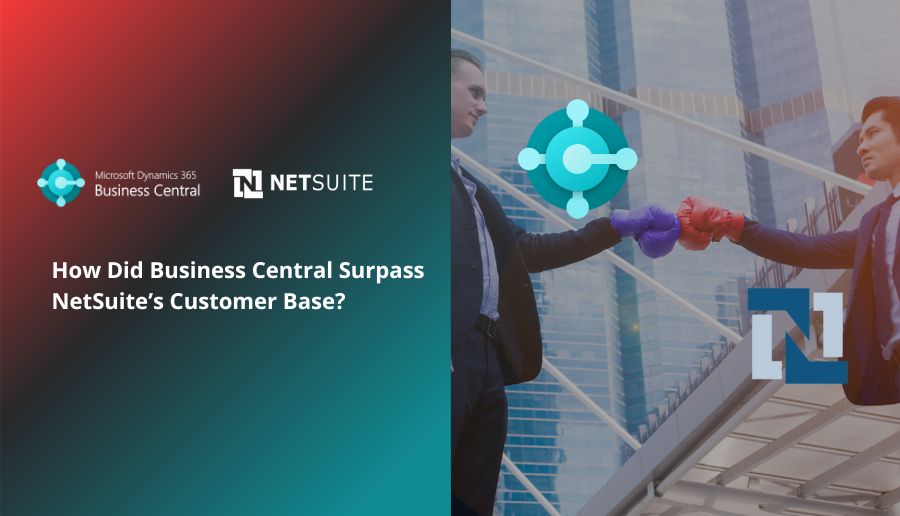
In the fierce arena of Enterprise Resource Planning (ERP) systems, Microsoft’s Dynamics 365 Business Central has surpassed the renowned NetSuite in the race for the largest user base. This accomplishment is especially significant, considering that Business Central is comparatively a “younger” system.
How did Business Central manage to outpace an established player like NetSuite? Let’s dive into the reasons behind this milestone.
Rapid User Growth and Market Leadership
As of the latest Microsoft report, Business Central boasts over 40,000 customers.
Business Central has seen a staggering 75% year-over-year increase in monthly active users (MAUs).

Screenshot taken from MSDW article on 7/31/24
This explosive growth has not only solidified its position as a leading ERP solution but also enabled it to surpass NetSuite. This announcement came as to no surprise to TMC, as Business Central was also named as Forbes Advisor’s #1 ERP SMBs, highlighting its overall pricing, user-friendly interface, robust integrations with the entire Microsoft Technology Stack, comprehensive support, and of course its AI (Copilot) funcationalities.
In fact, Microsoft’s strategic push to migrate customers from legacy ERP systems like Dynamics NAV and Dynamics GP to Business Central is another key factor in its success. A recent article stated that in 2014, Microsoft had 110,000 Dynamics NAV and 47,000 Dynamics GP customers. Today, these groups form a substantial portion of the 40,000+ organizations that have transitioned to Business Central.
How does high user adoption impact businesses like yours?
High user adoption can help identify patterns and areas for improvement, leading to more tailored updates as well as more feedback, highlighting issues and new features for user satisfaction with continued use.
The Power of AI in Business Central
Mike Morton, VP for Dynamics 365 Business Central, emphasized the critical role of AI in the system's future, making Microsoft the leader when it comes to AI-Powered ERPs. This strategic focus on growth and market leadership underscores Business Central's commitment to innovation and customer satisfaction.
In addition, Microsoft's vision for AI in Business Central goes beyond mere assistance; it aims to create autonomous agents that can function independently, much like self-sufficient workers. This concept, known as "agentification," is already taking shape within the broader context of the Power Platform and Dynamics 365.
During the recent Build 2024 event, Microsoft outlined plans for new AI agents in Power Automate. These agents will be trained by humans and then operate autonomously, performing tasks similar to robotic process automation (RPA) bots or even Power Automate flow developers. This shift towards AI-driven automation promises to enhance efficiency, reduce manual workloads, and drive business growth – which puts Business Central in the lead compared to its competitors.
The Era of Technology Consolidation
One of the major trends in the ERP market is the consolidation of systems. Many businesses are looking for ways to streamline their processes, reduce costs, and improve efficiency by using a single system that can handle all their business needs. Having multiple systems from different vendors can create silos, data inconsistencies, and integration challenges that hamper productivity and performance. By consolidating systems, businesses can avoid these issues and benefit from a unified and seamless experience across their operations.
This is where Microsoft has a clear advantage over its competitors like NetSuite. Microsoft has designed its product lines with the intention of creating an ecosystem where all the systems work and communicate with each other. Whether it's Microsoft 365, Teams, Power BI, Power Apps, or Power Automate, Microsoft offers a range of solutions that can integrate seamlessly with Dynamics 365 Business Central, its flagship ERP system for SMBs. This means that businesses can leverage the capabilities of these existing Microsoft apps and enhance them with Business Central's comprehensive features, such as financial management, supply chain management, project management, service management, and AI-driven insights. No other vendor can offer this level of integration and functionality across its products. This is why Business Central stands above NetSuite and its competitors – Microsoft is the only vendor that can deliver this robust capability.
"We're not surprised to see Dynamics surpass Netsuite in the market. Businesses today want to capitalize on their existing apps. Companies already utilizing Power Apps, Power BI for reporting, Teams, SharePoint, and Copilot find it logical to adopt Dynamics 365 Business Central (D365 BC). This integration allows them to leverage a comprehensive suite of capabilities. While Netsuite has a longstanding presence, Dynamics stands out as the most modern product platform, offering continuous updates and advanced integration features that facilitate growth."
– Jennifer Harris | CEO & President of TMC
Conclusion
Business Central’s rapid growth, robust AI integration, and strategic migration from legacy systems make it the best ERP solution for SMBs. Its ability to surpass NetSuite in user adoption is a testament to its superior capabilities and customer-centric approach. As AI continues to play a pivotal role in its development, Business Central is well-positioned to lead the market, driving innovation and delivering unparalleled value to SMBs worldwide allowing them to operate like an enterprise at a lower cost.
Work with a premier Microsoft Solutions Partner like TMC to guide you in your Business Central migration. Speak to our expert today to discuss how it can benefit your business.





